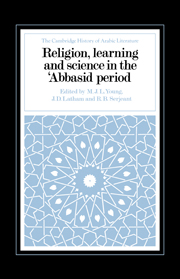Book contents
- Frontmatter
- Epigraph
- Contents
- List of plates
- Editorial preface
- List of abbreviations
- Map Literary, political and religious centres in the ʿAbbasid period
- 1 Sunnī theology
- 2 Shīʿī theological literature
- 3 Ibāḍī theological literature
- 4 Quranic exegesis
- 5 The prose literature of Ṣufism
- 6 Philosophical literature
- 7 Arabic lexicography
- 8 Arabic grammar
- 9 Islamic legal literature
- 10 Administrative literature
- 11 Arabic biographical writing
- 12 History and historians
- 13 Faṭimid history and historians
- 14 Mathematics and applied science
- 15 Astronomy
- 16 Astrology
- 17 Geographical and navigational literature
- 18 The literature of Arabic alchemy
- 19 Arabic medical literature
- 20 Al-Kindī
- 21 Al-Rāzī
- 22 Al-Fārābī
- 23 Ibn Sīnā
- 24 Al-Bīrūnī and the sciences of his time
- 25 Al-Ghazālī
- 26 Christian Arabic literature in the ʿAbbasid period
- 27 Judaeo-Arabic literature
- 28 The translation of Greek materials into Arabic
- 29 Didactic verse
- Glossary
- Bibliography
- Index
18 - The literature of Arabic alchemy
Published online by Cambridge University Press: 05 July 2014
- Frontmatter
- Epigraph
- Contents
- List of plates
- Editorial preface
- List of abbreviations
- Map Literary, political and religious centres in the ʿAbbasid period
- 1 Sunnī theology
- 2 Shīʿī theological literature
- 3 Ibāḍī theological literature
- 4 Quranic exegesis
- 5 The prose literature of Ṣufism
- 6 Philosophical literature
- 7 Arabic lexicography
- 8 Arabic grammar
- 9 Islamic legal literature
- 10 Administrative literature
- 11 Arabic biographical writing
- 12 History and historians
- 13 Faṭimid history and historians
- 14 Mathematics and applied science
- 15 Astronomy
- 16 Astrology
- 17 Geographical and navigational literature
- 18 The literature of Arabic alchemy
- 19 Arabic medical literature
- 20 Al-Kindī
- 21 Al-Rāzī
- 22 Al-Fārābī
- 23 Ibn Sīnā
- 24 Al-Bīrūnī and the sciences of his time
- 25 Al-Ghazālī
- 26 Christian Arabic literature in the ʿAbbasid period
- 27 Judaeo-Arabic literature
- 28 The translation of Greek materials into Arabic
- 29 Didactic verse
- Glossary
- Bibliography
- Index
Summary
THE NATURE AND AIMS OF ALCHEMY
Many thousands of pages have been written by modern scholars on the subject of alchemy, but it cannot be said that all the obscurities that render the subject so difficult have yet been satisfactorily elucidated. These obscurities include the actual definition of the term “alchemy”, its origins in East and West, the authorship of many of the extant texts, the motives and beliefs of the alchemists, the methods they used and the identification of many of their materials. Only in the case of laboratory equipment and processes do we have any firm data, largely because most types of equipment used by the alchemists have survived into the present or recent past. Moreover, in several alchemical works, notably those of Abū Bakr Muḥammad b. Zakariyyaʾ al-Rāzī, many pieces of equipment are clearly described and illustrated and can be understood by comparing them with their modern counterparts. Even so, although the basic purposes of the equipment can usually be determined, uncertainty as to the course of a given process may remain if we do not know the precise composition of the materials being processed.
Much of the obscurity of the subject is due to its esoteric nature and the consequent use made by its practitioners of analogy, allusion and cryptic utterances. A second difficulty lies in the tendency of many writers to attribute their own work to earlier, sometimes mythological, personages.
- Type
- Chapter
- Information
- Religion, Learning and Science in the 'Abbasid Period , pp. 328 - 341Publisher: Cambridge University PressPrint publication year: 1990
- 26
- Cited by



